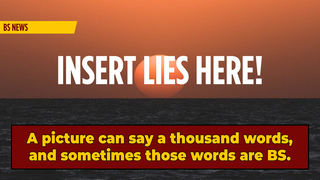You're More Likely to Believe Misinformation In Image Form

Have you ever wondered why certain, um, other websites (not us, we're clean) publish questionably sourced facts in the form of text on top of only somewhat related images? For example:

It's probably because you're more likely to believe a claim, regardless of its veracity, that is accompanied by an image of the subject. In an increasingly desperate series of experiments that already featured the uncomfortably dense inclusion of a word coined by Stephen Colbert, researchers first presented people with a series of celebrity names. Some they knew, some they didn't; some with images of the celebrity in question, some without -- and asked them to agree or disagree with the statement "This famous person is alive" or "This famous person is dead." You'd think visual evidence of someone doing distinctly non-dead things would bias you in favor of aliveness, but no -- people were more inclined to believe the claim, whether it was "alive" or "dead," if it was accompanied by a photo.
Researchers then tried presenting people with a text description of the subject versus a photo, and again, the photo won out (or lost, depending on how you feel about the credibility of misinformation). Finally, researchers presented people with random facts that varied from "common knowledge" to "GTFOH," and again, if they presented the claim that, say, turtles are deaf with a photo of a turtle of indeterminate hearing ability, people were more likely to believe it.
Don't Miss
Researchers think this has to do with the way images generate information in our minds that subtly encourages our confirmation biases. We see a picture of James Woods, and our brains conjure up a number of facts, like "James Woods has gray hair," "James Woods was on The Simpsons," and "James Woods sucks." Those are all true, so why wouldn't this new fact be true? But just know that in the future, when Cracked breaks news of James Woods meeting his inevitable end due to complications from Bigfoot ass-eating that you can share that accompanying graphic confident that it's the truth.
Manna, regrettably, has a Twitter.
Top image: Bruno Aguirre/Unsplash